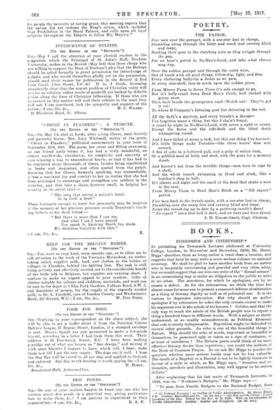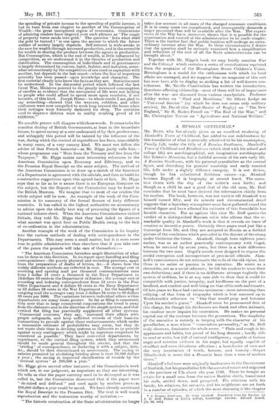BOOKS.
ECONOMICS AND CITIZENSHIP.*
IN publishing his Newmarch Lectures (delivered at University College, London, in November and December, 1916) Mr. Henry Higgs) describes them as being rather a tract than a treatise, and suggests that later he may write a more serious volume on national economy. Wo shall bo glad to have another book from an author who is invariably entertaining and graceful and very often witty, but we would suggest that one who can write of the " dismal science" in an entertaining way is under an obligation to the public to write in no other. The anecdotes, for which he apologizes, are by no means a defect. As for the reiterations, we think tho time has almost come for some one to present a reasoned defence of reiteration as a thing of literary dignity as well as of polemical use. It is the custom to deprecate reiteration. But why should an author apologize if by reiteration he takes the only certain course to make his argument rest in She minds of his hearers ? Cobden said that the only way to reach the minds of the British people was to repeat a thing a hundred times in different words. With a subject so slowly understood, or so readily misunderstood, as Political Economy that rule is nearly indispensable. Repetition might be defended on eevoral other grounds. An echo is one of tho beautiful things in Nature. Why should the echo of words, important or beautiful in themselves, be presumed ugly or taken as a sign of confusion, er at least of untidiness ? The Hebrew poets could think of no more effective literary device than repetition ; nor could the authors of the Book of Common Prayer. So we ask Mr. Triggs to ponder the question whether more serious books may not bo leaa valuable The touch of a Bagehot or a Bastiat is not to be lightly forsworn in favour of a style in which, as Mr. Higgs says, " iteration and re- iteration, anecdote and illustration, may well appear to be serious defects."
After explaining that his last series of Newmarch Lectures, in 1893, was on " Worlunen's Budgets," Mr. Higgs says :— " To pass from Family Budgets to the National Budget, from • (1) National Economy : an Outline of Pattie Administration. By Henry Trigg& C.B. London : Macmillan and Co. [3a. ad. net4—(2) IVar and the Citizen : Urgei (questions of the Day. Edited by the Rev. G. II. Code. With an Introduction by Neville Chamberlain. London: Hodder and Stoughton. [2a. ed. net.I
the spending of private income to the spending of public income, is but to turn from one chapter to another of the Consumption of Wealth—the great unexplored region of economics. Generations of admiring readers have lingered over such phrases as ` The magic of property turns sands into gold.' The question Into what shall the gold be tinned ? ' is one upon the answer to which the future welfare of society largely depends. Self-interest is wide-awake in the race for wealth through increased production, and in the scramble for wealth in sharing the produce between the agents in production. But Consumption, which is the end of wealth, is little influenced by competition, as wo understand it in the theories of production and distribution. The consumption of individuals and of governments is largely determined by custom, habit, fashion, and imitation, some- what unconsciously by the competition of one need or aspiration with another, but depends in the last resort—when the line of imperious necessity has been passed—upon knowledge and character. The first essential clearly is to know the facts as they aro. Statistics must be understood. In the distressful period which followed the last Groat War, Ministers pointed to the greatly increased consumption of candles as evidence that the necessaries of life were not lacking to people who could afford to spend more upon comforts, if not luxuries, of this kind. Joseph Hume—to whose credit I am glad to say something—showed that the weavers, cobblers, and othor craftsmen were now compelled to work long beyond the hours when their cottages were formerly darkened for sleep. The statistics used to disprove distress wore in reality crushing proof of its
existenco."
No sensible person will disagree with those words. It seems to be the manifest destiny of British Governments, at least in the immediate future, to spend money at a rate undreamed of by their predecessors, and unhappily this period will bo tainted by the influence of the war, during which the control of expenditure has been, unavoidably in many cases, of a very cursory kind. Wo must not follow the advice of that French humorist—as Mr. Higgs justly calls him— whose programme was " More from the Treasury and loss from the Taxpayer." Mr. Higgs makes most interesting references to the American Commission upon Economy and Efficiency, and to the Prussian Royal Rescript on the same subject. Tho method of the American Commission is to draw up a sketch of the functions of a Department in agreement with the officials, and then to build its constructive suggestions upon this agreed basis of fact. Mr. Higgs says that so far as he is aware there is no European literature on the subject, but the Reports of the Commission may bo found in the British Museum. We imagine that to most of our readers the whole subject will be now. An example of the work of the Com- mission is its summary of the formal finance of forty different countries. It has called in the highest authorities on accountancy to advise upon the ideally best way of presenting the figures of a national balance-sheet. 'When the American Commissioners visited Britain, they told Mr. Higgs that they had failed to discover what amount was spent hero on Public Health owing to the lack of co-ordination in the administration.
Another example of tho work of the Commission is its inquiry into the various methods of dealing with correspondence in the Departments. This may seem a small matter, but it is oven more true in public administration than elsewhere that if you take care of the pence the pounds will take care of thernsolvca
" The American Commission furnishes ample illustration of what can be done in this direction. In its report upon handling and filing correspondence—the purely physical and recording processes, apart from the preparation of drafts of letters, &c.—it shows how the widely different methods are reflected in cost. The average cost of receiving and opening mail per thousand communications runs from 1 dollar 21 cents a thousand in the Navy Department to 13 dollars 63 cents in the Department of Justice ; the average cost of recording and indexing correspondence from 52 cents -in the Post Office Department and 8 dollars 93 cents in the Navy Department to 62 dollars 98 cents in the War Department ; for the handling of outgoing mail the averages vary from 5 dollars 94 cents to 69 dollars 89 cents per 1000. Tho variations between individual offices within departments are many times greater. So far as filing is concerned, they note that in largo commercial corporations the trend is away from the elaborate and in the direction of the simple system, and that vertical flat filing has practically supplanted all other systems. ` Commercial concerns,' they say, ' surround their affairs with proper safeguards, and keep sufficient records of their business transactions to provide against those embarrassments which under a reasonable estimate of probabilities may occur, but they do not waste their time in devising systems so elaborate as to provide against every contingency which might by ingenious conjecture be conceived as possible.' They have converted departments, by experiment, to the vertical filing system, which they recommend should be made general throughout the service, and that the ` briefing ' of correspondence, or docketing it with a subject, date, &c., should be then discontinued as unnecessary. The saving in salaries promised by abolishing briefing alone is over 88,500 dollars a year ; the saving in improved classification of records by the ` decimal system' at 200,000 a year."
Mr. Higgs gives several other instances of the Commission's work which are, in our judgment, as important as they are interesting. Ho tells us that the paper currency used to he destroyed as it was called in,_ but the Commission discovered that if the paper were " do-inked and defibrod " and used again by modern processes 100,000 dollars a year could be saved. We have already mentioned the Royal Rescript to the Prussian Diet. The text is well worth reproduction and the instruction worthy of imitation :— " The historic construction of the State administration no longer takes due account in all cases of the changed economic conditions. It is in many cases too complicated, and consequently demands a larger personnel than will be available after the War. Tho experi- ences of the War have, moreover, shown that it is possible for the organisation and control of the administration to be made simpler. There is the further fact.that public burdens will undergo an extra- ordinary increase after the 1% ar. In those circumstancea I desire that the question shall be seriously examined how a simplification and reduction of the cost of all the State administrations can be brought about."
Together with Mr. Higga's book wo may briefly mention War and the Citizen,2 which contains a series of contributions reprinted from tho magazine of the Birmingham Street Children's Union. Birmingham is a model for the enthusiasm with which its local affairs are managed, and we suppose that no magazine of this sort has ever boon able to display so striking a list of well-known con- tributors. Mr. Neville Chamberlain has written the introduction.
Questions affecting citizenship—most of thorn will bo of importance after the war—aro discussed from various standpoints. Professor Ashley writes on " Mind and Munitions," Sir Oliver Lodge on " Universal Service " (by which ho does not mean only military service), Dr. David (the Head-Master of Rugby) on "Tho New England," Sir R. Baden-Powell on " The End of the War," and Mr. Christopher Turner on " Agriculture and National Welfare.'



























 Previous page
Previous page